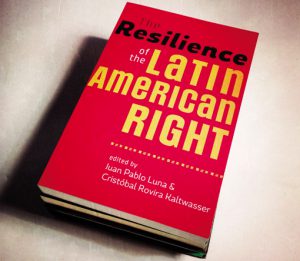Monday Memo: Peru COP20 — Uruguay Election — Colombia Peace Talks — Venezuela Oil — Cuba GDP
This week’s likely top stories: Global leaders gather in Lima for the COP20 Climate Summit; Tabaré Vázquez wins the runoff presidential election in Uruguay; With FARC hostages released, Colombian peace talks are set to resume in Havana; Venezuela braces for impact as oil prices hit rock bottom; Cuba misses the mark on economic growth in … Read more
Uruguay Elects Successor to Mujica
It seems everyone in Montevideo has a personal story of crossing paths with Uruguay’s folksy sandal-wearing president, José “Pepe” Mujica. Romina Tortorella recalled the time she looked out her Montevideo house window to see Mujica’s light-blue 1987 Volkswagen Beetle, which he recently refused to sell for $1 million to a wealthy sheik. Mujica was eating … Read more
Luis Suárez: Vilified Worldwide, Beloved in Uruguay
On November 13, as Uruguay’s national soccer team, La Celeste (The Sky Blue), ran onto the pitch at Montevideo’s Estadio Centenario, the biggest cheer came for the most scandalous of soccer heroes. Luis Suárez, who has earned the enmity of players, fans, and at least one prime minister for his race-tinged language and taste for … Read more
Argentina Creates New Regulatory Body for Foreign Trade
The Argentine government published a decree on Monday that establishes the Unidad de Seguimiento y Trazabilidad de las Operaciones de Comercio Exterior (Tracking and Tracing of Foreign Trade Transactions Unit), which will monitor the flow of goods, services, and currency into and out of the country. According to Decree 2103/2014, the new agency will operate … Read more
Monday Memo: Colombia Peace Talks — U.S. Refugee Status — Petrobras Arrests — Cuba Tourism — Pemex Investments
This week’s likely top stories: Colombia’s peace talks suspended over kidnapping; U.S. will grant refugee status to select minors from Central America; Brazilian police arrest 27 in Petrobras corruption scandal; Cruise ship tourism is booming in Cuba; Pemex invests millions in hydrocarbon production and exploration. Kidnapping Halts Colombian Peace Talks: Colombian President Juan Manuel Santos … Read more
Latin American Leaders Seek Chinese Investment at APEC
Beyond seeking to deepen trade links with Asia, the leaders of Chile, Peru and Mexico—the three Latin American member states of the Asia-Pacific Economic Cooperation (APEC)—used their time in Beijing to push for greater Chinese investment in their countries. The three leaders also backed a Chinese-led proposal for a Free Trade Area of the Asia … Read more
São Paulo asks for $1.4 billion for Infrastructure Projects to Alleviate Drought Crisis
São Paulo Governor Gerardo Alckmin presented a $1.4 billion plan for eight infrastructure projects to mitigate the state’s drought crisis in a meeting with President Dilma Rousseff in Brasília yesterday. The meeting took place at the Palácio do Planalto between Rousseff, Alckmin, Environment Minister Izabella Teixeira and Planning Minister Miriam Belchior, with Belchior voicing concern over … Read more
Is Dilma Rousseff the Answer for Brazilian Women?
Brazil’s October 26 election was undoubtedly contentious. As incumbent Dilma Rousseff edged out centrist opposition leader Aeció Neves in a runoff with only 51.6 percent of the vote, it was one of the closest elections in Brazilian history. Ultimately, the Brazilian people opted for another four years with the Partido dos Trabalhadores (Workers’ Party—PT). So … Read more
Monday Memo: Brazil Military Drills — Mexico High-Speed Rail — Colombia FARC Trials — AT&T Expands — Mexico Protests
This week’s likely top stories: Brazil’s military launches training operation in Amazon; Mexico cancels high-speed rail contract to Chinese-led consortium; Indigenous court in Colombia convicts seven FARC members; AT&T purchases Iusacell; Mexico erupts in protests over reported discovery of remains of the 43 missing students. Brazilian Military Trains in the Amazon: According to the chief … Read more

Civic Innovator: Alessandra Orofino
Alessandra Orofino’s globetrotting career as a student and human rights advocate has always flirted with political activism. The 25-year-old Rio de Janeiro native has lived in Montreal, Paris, New Delhi, and New York. But when she returned to Rio in 2008 to work as a field researcher on gender-based violence, she realized that the most … Read more

Business Innovator: Diego Saez-Gil
Sitting in a dingy Internet café in a strange city and paying in 15-minute increments to use a computer is no traveler’s idea of fun. After backpacking through 23 European countries, Argentine-born Diego Saez-Gil knew there had to be a better alternative. The advent of smartphones inspired him to invent one: an app that could … Read more

The Resilience of the Latin American Right
Unlike the internationalist left over the past century, the Latin American right has never been united by a single symbol or slogan. This was not accidental. In a region that only recently abandoned military dictatorship, why would political parties openly identify with repressive authoritarian regimes? And with 165 million people still living in poverty, hoisting … Read more

DIY Wine
Like many wine aficionados, José Manuel Ortega Gil-Fournier wondered what it would be like to bottle his own varietal. To turn his dream into a reality, the Spanish-born investment banker left his successful career to start his own vineyard. But this venture came with an innovative entrepreneurial twist. Launched in 2012, his O. Fournier Wine … Read more

Brazil: The Troubled Rise of a Global Power
Brazil’s most well-known cartoonist, Ziraldo Alves Pinto, said in 2010 that his country ought to have an exclamation point after its name, considering the excitement that accompanied most discussions of the southern hemisphere’s powerhouse economy at the time. The euphoric approach was matched by the international media: a November 2009 cover of The Economist magazine … Read more
Monday Memo: Ecuador Amendments — P&G Tax Fraud — Brazil Solar Parks — U.S. Midterm Elections – Colombia Paramilitary Sentenced
This week’s likely top stories: Ecuador’s National Assembly dismisses referendum on controversial constitutional amendments; Argentina suspends Proctor & Gamble for fiscal fraud; Brazil grants contracts for 31 new solar parks; U.S. gears up for midterm elections and immigration reform; Colombian court sentences AUC paramilitary leader to 8 years. Ecuador’s National Assembly Strikes Down Referendum on … Read more


